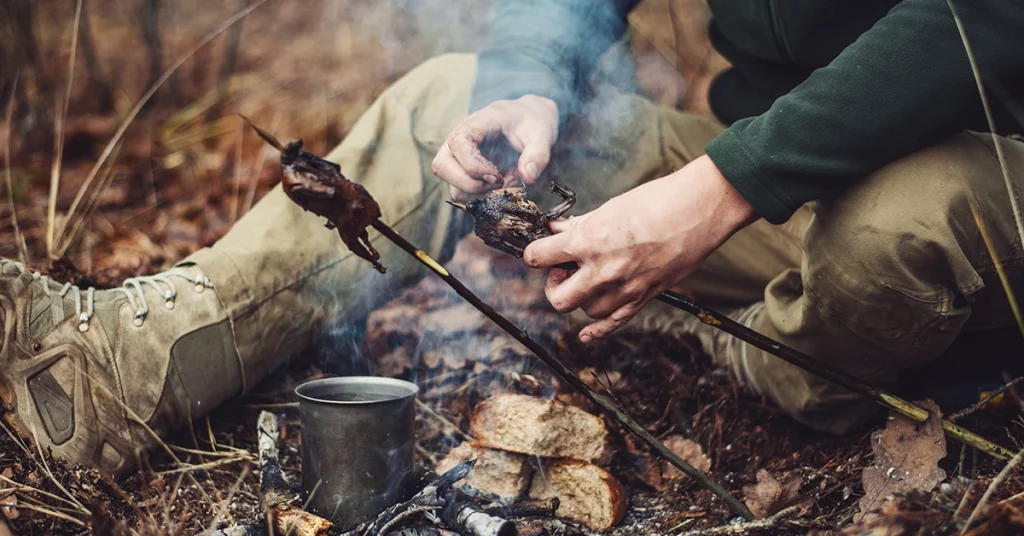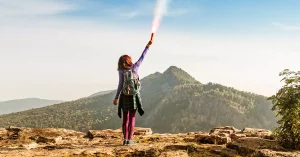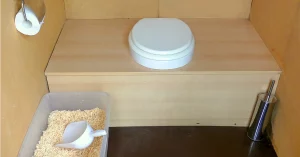I love being out in the wilderness, as far from the creature comforts of home as possible. However, regular camping wasn’t scratching that itch for me.
I wanted to be closer to nature, coexisting with it long-term rather than bringing the indoors out. Then I discovered bushcraft camping: the beautiful combination of camping and survival.
What Is Bushcraft Camping?
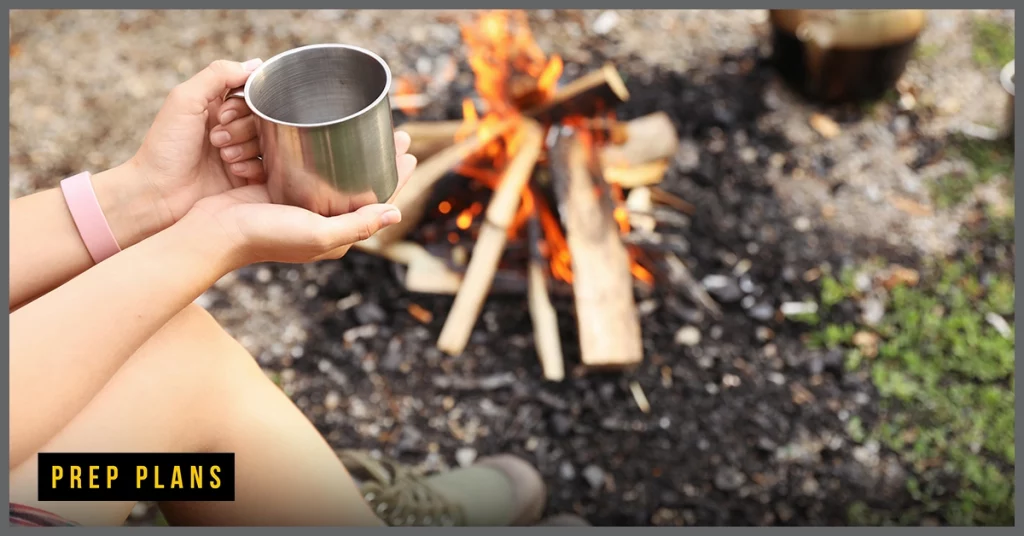
Bushcraft camping is closely related to camping and survival, but at its heart is a purpose different from either. People who practice bushcraft aim to live with nature, embracing the natural world and learning to thrive using only resources that nature provides.
Bushcraft vs. Camping
As an outdoor hobby, regular camping usually involves a relatively brief outdoor adventure. When people go on a camping trip, they often bring many of the comforts of modern life with them. At a minimum, campers bring shelter, food, cooking equipment, and utensils, but many people enjoy “glamping,” which brings the convenience of home to designated campsites.
On the other hand, people who practice bushcraft bring minimal equipment with them. Your goal is to coexist with nature long-term, not fill it up with human stuff.
Hence, bushcraft campers carry only the essential items, such as fire-making equipment, navigation tools, and essential cooking gear, if you carry anything at all. You’ll gather the rest of what you need from nature.
Bushcraft vs. Survival
Bushcraft and survival are closely related in that survival skills are helpful in bushcraft, but the big difference between the two is the overall goal. In an actual survival situation, you’re trying to use limited natural resources to get by for a short time until rescue arrives. Practicing survival skills involves simulating a survival situation by going into the wilderness with almost nothing.
Bushcraft camping goes beyond basic survival, though. Bushcraft campers intend to stay in nature long-term, so you want to do more than just scrape by; you want to thrive. Bushcraft requires skills to make the natural environment more comfortable to enjoy your time outdoors for as long as you want; perhaps even indefinitely.
Bushcraft Skills
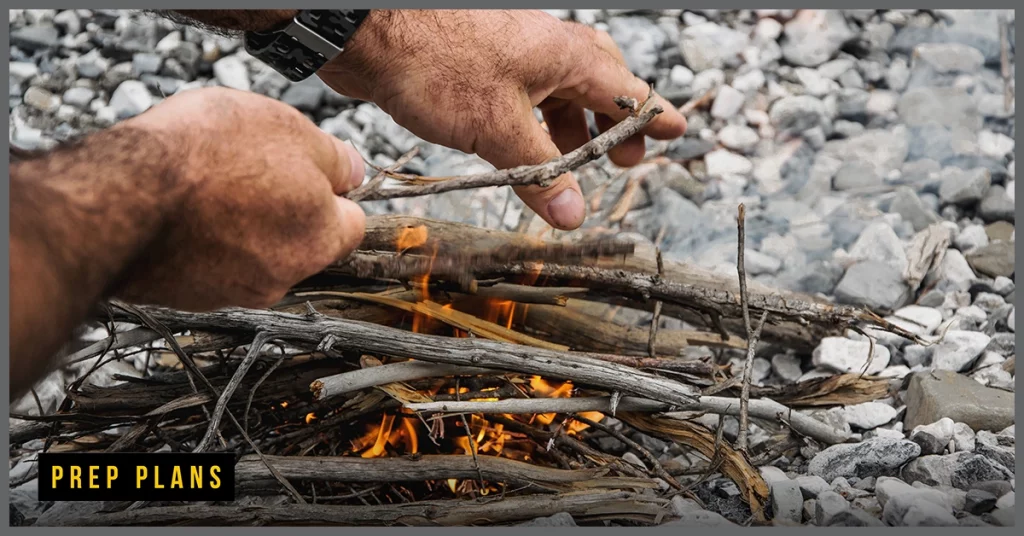
The skills required for bushcraft camping combine essential survival skills with long-term self-sufficiency outdoors. A bushcraft experience often has meager beginnings, where you’ll use primitive survival skills to get by. Over time, however, you’ll use more advanced bushcraft skills to create your own luxury in the wilderness.
Wilderness Survival Skills
Bushcraft skills are often based on basic survival, but they’re more sustainable for long-term living. Basic wilderness skills like shelter and fire building will get you started, and you’ll learn to use what’s available around you to be more efficient so you can move beyond survival and start thriving.
Fire Making
One of the first things you’ll have to do while bushcraft camping is build a sustainable fire. You’ll need it for warmth, water purification, food preparation, etc.
Some bushcraft adventurers bring a few matches or a lighter with them, but long-term bushcraft demands that you learn to build a fire using what’s available in nature, using a fire steel and tinder or a crafted bow drill.
Shelter Building
Some bushcraft adventurers bring a tent, tarp, or other shelter material, but true bushcraft is about using the natural resources around you. You’ll need to learn how to build yourself a primitive survival shelter, from choosing the right location to gathering and assembling them in a way that keeps you warm and dry, even in cold and rainy weather.
First Aid
Many campers bring a first aid kit with them. It’s one modern convenience worth having around, no matter how primitive you want your bushcraft experience to be. However, skills required for long-term survival include using natural materials and ingredients to treat injuries. This survival skill will keep you safe long after your first aid kit runs out.
Long-Term Bushcraft Skills
Long-term bushcraft camping means going beyond basic survival. These skills will help you make the most of your wilderness adventure rather than just scraping by. Learning new skills like these will make it possible for you to produce your own food, equipment, and even some primitive luxuries.
Plant Identification & Foraging
Your ability to thrive in the wilderness long-term depends a lot on your knowledge of the natural environment around you. Plant identification skills will help you locate edible, medicinal, and helpful plant materials while avoiding dangerous and poisonous ones. You’ll learn what kinds of plants are edible, how to use them medically, and which ones make suitable building materials.
Hunting, Fishing & Trapping
Protein is hard to come by in the wilderness, but the most efficient source of it is, of course, meat. Living your best life outdoors means learning how to obtain meat, though there are many ways to do that.
Some campers learn to hunt and fish using a crafted bow, rod, or spear, while others make snares and other traps to catch wild animals and fish.
These skills are good for more than just making food, though. Bones, antlers, and sinew from wild animals are excellent for crafting tools, and you can use skins to make leather.
Hunting and trapping skills give you access to a broader range of crafting materials, making your time in the wilderness more comfortable.
Wilderness Crafting
As you can imagine, long-term wilderness survival requires more gear than the typical bushcrafter brings with them on their adventure. Your ability to craft tools and other survival items will be the difference between just scraping by and thriving in your natural environment.
Bushcrafters often make their shelters and essential tools using the things they find in nature, but the sky is the limit when it comes to wilderness crafting. You can learn to craft your own knife, bow drill, rope, canoe, traps, containers, and more.
Essential Bushcraft Gear
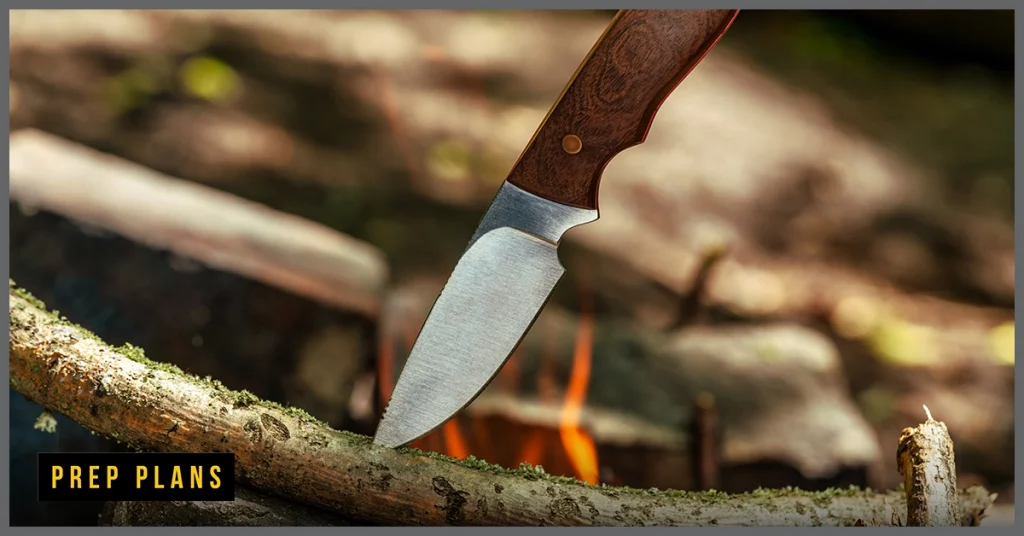
Some bushcraft purists wander out into the wilderness with nothing but the clothes on their backs, but you’ll probably want to bring at least a few essentials with you if you’re new to bushcraft. While nature provides everything you need to survive, some essential equipment will make the experience more enjoyable.
Shelter
You can build your own bushcraft shelter using no gear at all, but many bushcrafters find it helpful to start with a tarp to make sure their shelter is waterproof. A hammock is also useful to help you stay dry even when the ground is soggy. In cold climates or seasons, you may want a sleeping bag to help you stay warm at night.
Water
You’ll want two water containers at a minimum – one to drink from and one to boil water in. An old coffee can is perfect for boiling, and you can use a trash bag or space blanket to collect rainwater. You may also want to bring some water purification tools, like a pump filter or filter bag.
Tools
You can craft a lot of tools using things found in nature, but a few essential items can make a big difference in how challenging your bushcraft adventure is. Most bushcrafters carry a knife, at a minimum, and you may also want a folding saw to make it easier to gather materials. I also recommend a compass to help with navigation skills.
Final Thoughts
Bushcraft is a fun and inexpensive way to connect with the natural world around you. You don’t need any specialized equipment to get started, and you can even practice most of your new skills in your own backyard.

